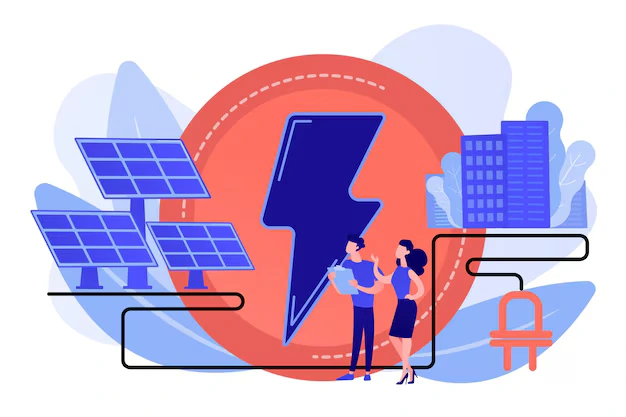 Types of Energy Procurement Strategies
Types of Energy Procurement Strategies
There are several energy procurement strategies that large businesses can use, depending on their risk tolerance, energy consumption, and market conditions. The two most common strategies are fixed-rate contracts and variable-rate contracts, but businesses can also explore more complex options such as energy hedging or group purchasing agreements.
Fixed-Rate Contracts
A fixed-rate contract locks in the price of energy for a specific period, typically 1 to 5 years. This strategy provides price stability and helps businesses manage their energy budget effectively. It’s ideal for businesses that want to avoid the risk of price volatility.
Variable-Rate Contracts
A variable-rate contract allows the price of energy to fluctuate with the market. This strategy can result in cost savings during periods of low energy prices but exposes businesses to potential price hikes when demand is high or supply is constrained.
Energy Hedging
Businesses with significant energy consumption can use hedging strategies to protect themselves from price spikes. Hedging involves buying energy futures or options to lock in prices for future energy needs.
Group Purchasing Agreements
Some businesses join energy purchasing groups or energy cooperatives, where multiple organizations pool their energy needs to negotiate better rates from suppliers.
 Fixed-Rate vs. Variable-Rate Contracts
Fixed-Rate vs. Variable-Rate Contracts
The decision between fixed-rate and variable-rate energy contracts comes down to risk tolerance and business goals. Here’s a closer look at the pros and cons of each:
Feature
Price Stability
Risk Level
Flexibility
Savings Potential
Best For
Fixed-Rate Contracts
Offers stability with predictable costs
Low risk, protected from price increases
Limited flexibility due to long-term contracts
May miss out on savings during price drops
Businesses that need budget certainty
Variable-Rate Contracts
Prices can fluctuate based on market conditions
Higher risk, potential for price spikes
More flexible, easier to switch when needed
Potential to save when market prices are low
Businesses willing to take on market risk
 Risk Management in Energy Procurement
Risk Management in Energy Procurement
Managing risk is a critical component of energy procurement. Energy prices can be influenced by several factors, including market volatility, geopolitical events, natural disasters, and changes in regulatory policies. Businesses must balance the need for price stability with the potential for cost savings by considering the following risk management strategies:
-
Hedging: As mentioned earlier, hedging allows businesses to lock in prices for future energy needs, protecting against price spikes.
-
Diversification: Sourcing energy from multiple suppliers or using a combination of energy sources (e.g., renewable energy, fossil fuels) can help reduce reliance on a single supplier and spread risk.
-
Monitoring Market Trends: Regularly tracking energy market trends and regulatory changes can help businesses anticipate price changes and adjust their procurement strategies accordingly.
 The Role of Energy Brokers in Procurement
The Role of Energy Brokers in Procurement
Energy brokers play a key role in helping large businesses navigate the complexities of energy procurement. They act as intermediaries between businesses and energy suppliers, providing expertise, market insights, and negotiation support.
Benefits of Working with Energy Brokers:
-
Market Expertise: Brokers understand the energy market and can advise on the best time to purchase energy based on market conditions.
-
Supplier Negotiations: Brokers have relationships with multiple energy suppliers, allowing them to negotiate better rates and contract terms.
-
Contract Management: Many brokers offer ongoing contract management services, ensuring that businesses get the best deals and don’t miss renewal deadlines.
 How to Choose the Right Supplier
How to Choose the Right Supplier
Choosing the right energy supplier is crucial for ensuring reliable and cost-effective energy for your business. Here are some key factors to consider when selecting a supplier:
-
Reputation: Research the supplier’s track record, including customer service and reliability.
-
Pricing: Compare rates from multiple suppliers and assess the terms of their contracts.
-
Sustainability Options: If sustainability is a priority for your business, choose a supplier that offers renewable energy options or green energy contracts.
-
Contract Flexibility: Ensure the supplier offers flexible contract terms that align with your business’s needs.
 Sustainable Energy Procurement
Sustainable Energy Procurement
As more businesses commit to reducing their carbon footprints, sustainable energy procurement has become an essential part of many companies' strategies. Options include:
-
Green Energy Contracts: These contracts allow businesses to source electricity from renewable sources such as wind, solar, or hydropower.
-
Power Purchase Agreements (PPAs): A PPA is a long-term agreement where a business purchases electricity directly from a renewable energy provider at a fixed price.
-
Carbon Offsetting: Businesses can also invest in carbon offset programs to balance out the carbon emissions generated by their energy use.
 Conclusion: Optimizing Energy Procurement for Long-Term Success
Conclusion: Optimizing Energy Procurement for Long-Term Success
Energy procurement is a critical function for large businesses that want to manage their energy costs effectively, reduce risks, and meet sustainability goals. By understanding the different procurement strategies available, businesses can make informed decisions that align with their financial objectives and operational needs. Whether through fixed-rate contracts, variable-rate contracts, or sustainable energy procurement, the key to success lies in careful planning, regular market monitoring, and strategic partnerships with suppliers and brokers.
Insight from UtilityKing
At UtilityKing, we help large businesses optimize their energy procurement strategies by providing expert advice, tailored solutions, and access to the best energy suppliers. Whether you're looking to reduce costs, manage risk, or transition to renewable energy, we have the knowledge and resources to support your business.
 Introduction: Why Energy Procurement is Critical for Large Businesses
Introduction: Why Energy Procurement is Critical for Large Businesses
 Understanding Energy Procurement
Understanding Energy Procurement

